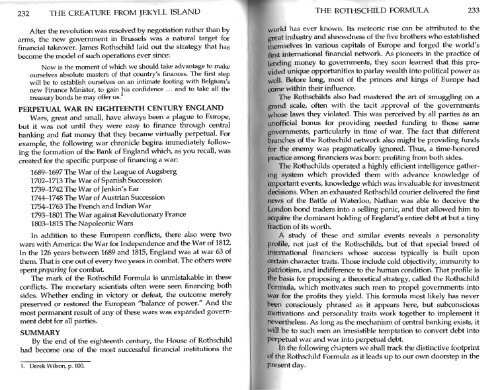Create successful ePaper yourself
Turn your PDF publications into a flip-book with our unique Google optimized e-Paper software.
232 THE CREATURE FROM JEKYLL ISLAND<br />
After the revolution was resolved by negotiation rather than by<br />
arms, the new government in Brussels was a natural target<br />
financial takeover. James Rothschild laid out the strategy that has<br />
become the model of such operations ever since:<br />
Now is the moment of which we should take advantage to make<br />
ourselves absolute masters of that country's finances. The first step<br />
will be to establish ourselves on an intimate footing with Belgium's<br />
new Finance Minister, to gain his confidence ... and to take all the<br />
treasury bonds he may offer us.<br />
PERPETUAL WAR IN OGHTEENTH CENTURY ENGLAND<br />
Wars, great and small, have always been a plague to Europe,<br />
but it was not until they were easy to finance through central<br />
banking and fiat money that they became virtually perpetual. For<br />
example, the following war chronicle begins immediately following<br />
the formation of the Bank of England which, as you recall, was<br />
created for the specific purpose of financing a war:<br />
1689-1697 The War of the League of Augsberg<br />
1702-1713 The War of Spanish Succession<br />
1739-1742 The War of Jenkin's Ear<br />
1744-1748 The War of Austrian Succession<br />
1754-1763 The French and Indian War<br />
1793-1801 The War against Revolutionary France<br />
1803-1815 The Napoleonic Wars<br />
In addition to these European conflicts, there also wer^ two<br />
wars with America: the War for Independence and the War of 1812.<br />
In the 126 years between 1689 and 1815, England was at war 63 of<br />
them. That is one out of every two years in combat. The others were<br />
spent preparing for combat.<br />
The mark of the Rothschild Formula is unmistakable in these<br />
conflicts. The monetary scientists often were seen financing both<br />
sides. Whether ending in victory or defeat, the outcome merely<br />
preserved or restored the European "balance of power/ 7<br />
And the<br />
most permanent result of any of these wars was expanded government<br />
debt for all parties.<br />
SUMMARY<br />
By the end of the eighteenth century, the House of Rothschild<br />
had become one of the most successful financial institutions the<br />
1. Derek Wilson, p. 100.<br />
for<br />
world has ever known. Its<br />
THE ROTHSCHILD FORMULA 233<br />
meteoric rise can be attributed to the<br />
great industry and shrewdness of the five brothers who established<br />
themselves in various capitals of Europe and forged the world's<br />
first international financial network. As pioneers in the practice of<br />
lending money to governments, they soon learned that this provided<br />
unique opportunities to parlay wealth into political power as<br />
Before long, most of the princes and kings of Europe had<br />
well.<br />
come within their influence.<br />
The Rothschilds also had mastered the art of smuggling on a<br />
grand scale, often with the tacit approval of the governments<br />
whose laws they violated. This was perceived by all parties as an<br />
unofficial bonus for providing needed funding to those same<br />
governments, particularly in time of war. The fact that different<br />
branches of the Rothschild network also might be providing funds<br />
for the enemy was pragmatically ignored. Thus, a time-honored<br />
practice among financiers was born: profiting from both sides.<br />
The Rothschilds operated a highly efficient intelligence gathering<br />
system which provided them with advance knowledge of<br />
important events, knowledge which was invaluable for investment<br />
decisions. When an exhausted Rothschild courier delivered the first<br />
news of the Battle of Waterloo, Nathan was able to deceive the<br />
London bond traders into a selling panic, and that allowed him to<br />
acquire the dominant holding of England's entire debt at but a tiny<br />
fraction of its worth.<br />
A study of these and similar events reveals a personality<br />
profile, not just of the Rothschilds, but of that special breed of<br />
international financiers whose success typically is built upon<br />
certain character traits. Those include cold objectivity, immunity to<br />
patriotism, and indifference to the human condition. That profile is<br />
the basis for proposing a theoretical strategy, called the Rothschild<br />
Formula, which motivates such men to propel governments into<br />
war for the profits they yield. This formula most likely has never<br />
been consciously phrased as it appears here, but subconscious<br />
motivations and personality traits work together to implement it<br />
nevertheless. As long as the mechanism of central banking exists, it<br />
will be to such men an irresistible temptation to convert debt into<br />
perpetual war and war into perpetual debt.<br />
In the following chapters we shall track the distinctive footprint<br />
of the Rothschild Formula as it leads up to our own doorstep in the<br />
present day.


